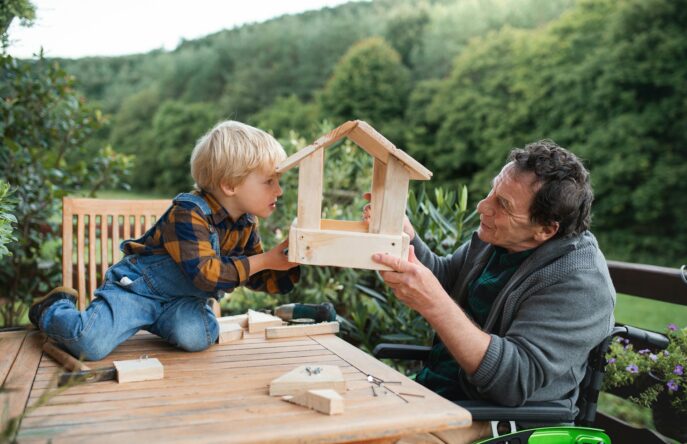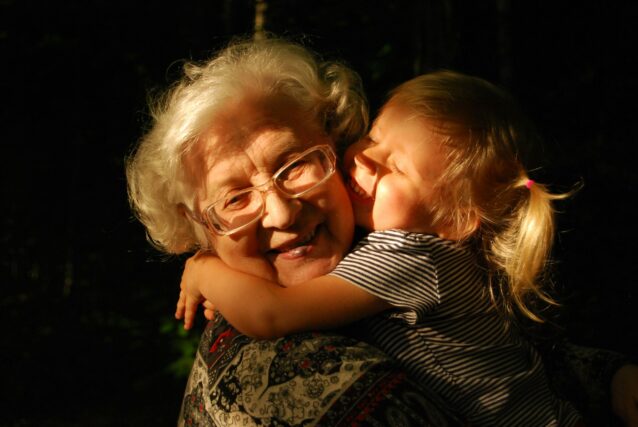Being a grandparent is one of life’s greatest gifts, but it can be tricky knowing how involved to be.

You want to show up, offer love, and be helpful, but without stepping on toes or overwhelming your grandkids. After all, you’re not their parent, but you are a central figure in their lives (or you should be)—you just need to strike a balance, which isn’t as hard as you might think. Here’s how to find that sweet spot.
1. Let them take the lead sometimes.

It’s tempting to plan every outing or conversation, but letting your grandchildren set the pace once in a while makes a huge difference. Whether they want to show you their latest Minecraft world or just sit quietly, letting them steer shows that you’re tuned into who they are.
Giving them some control builds trust and shows them you’re not just there to entertain—you’re there to connect. It keeps things feeling light and natural instead of forced or overly structured.
2. Avoid bombarding them with constant advice.

It’s natural to want to pass on your wisdom, but too much unsolicited advice can feel overwhelming. Sometimes they just need you to listen, not fix. A few well-timed words land better than a lecture every time. They’re often figuring things out in ways that are different from how you did it, and that’s okay. Staying curious about their journey instead of trying to steer it makes you a much more welcome sounding board.
3. Respect the parenting rules their mum and dad set.
 Source: Unsplash
Source: Unsplash Even if you don’t totally agree with all the house rules, backing them up shows respect and unity. Kids notice when adults are on the same page (and when they’re not!), and it affects how safe and secure they feel. It’s fine to have your own style when they visit you, but when it comes to the big stuff (like bedtime routines or food allergies), showing that you’re a team player makes everything smoother for everyone.
4. Give them breathing room to talk when they’re ready.

Kids and teens sometimes need time to open up. Bombarding them with questions right away can feel like pressure. Instead, creating relaxed moments, such as during a walk or car ride, often invites conversation naturally. Letting the silence stretch without rushing to fill it can actually lead to deeper chats. They’ll feel like they can come to you when they’re ready, instead of feeling interrogated.
5. Celebrate their interests, even if they’re not your thing.

Maybe you don’t understand their favourite YouTuber or why they love a certain sport, but showing genuine interest matters. Asking a few questions or letting them teach you something goes a long way. You don’t need to pretend to be obsessed with Roblox or skateboarding; it’s about letting them see that their passions are valid and important to you, simply because they’re important to them.
6. Offer help without making them feel helpless.

It’s wonderful to step in when needed, but kids, even little ones, want to feel capable. Instead of swooping in to solve everything, offer gentle support that still lets them lead the way where they can. Asking, “Would you like a hand with that?” instead of assuming they need it gives them the chance to show off their skills, and reminds them that you believe in their ability to figure things out.
7. Respect their growing independence.

As your grandchildren get older, they’re naturally going to want more space. That doesn’t mean they love you any less; it just means they’re becoming their own person. Letting them have that independence without guilt-tripping them builds trust, not distance. Stay available without hovering. Being someone they know they can always come back to without pressure is one of the greatest gifts you can give.
8. Avoid competing with other family members.
 Source: Unsplash
Source: Unsplash Sometimes it’s easy to fall into comparisons—who sees them more, who buys the best gifts, who gets the biggest hugs. But trying to “win” your grandchildren’s affection usually backfires and just makes things feel awkward for everyone. Your relationship with them is unique and special all on its own. Showing up authentically, without competition, creates a bond that no one else can replicate, and that’s far more powerful than trying to outshine anyone.
9. Keep promises, even the small ones.

Trust is built in the little moments, if you say you’ll call, call. If you promise ice cream next time, follow through. Consistency shows them they can count on you, and that feeling of security stays with them as they grow. Life gets busy, and things happen, but being mindful about the promises you make (and keep) plants seeds of reliability and love that are hard to shake, even through the ups and downs of life.
10. Show affection in the ways they’re comfortable with.

Not all kids are cuddly, and some teens might cringe at big hugs in public, and that’s okay. Respecting their boundaries when it comes to affection shows you’re paying attention to who they are and what makes them comfortable. Sometimes a high five, a quick arm squeeze, or a smile across the room says just as much as a bear hug. Meeting them where they are makes your love feel supportive, not suffocating.
11. Encourage them without piling on pressure.

It’s great to cheer your grandkids on, but if encouragement turns into pressure, it can backfire. Telling them you’re proud of their effort, not just their achievements, helps them build healthy confidence instead of fear of failure. Kids already feel enough pressure from school, peers, and sometimes even themselves. Knowing you love them for who they are, not just what they do, gives them a safe place to land.
12. Accept that sometimes they’ll choose their friends over you.

As they get older, grandkids naturally want to spend more time with friends, and that can sting a little. However, it’s part of growing up, not a rejection of you. Staying understanding about it keeps the door open for when they do want to reconnect. Being the grandparent who’s chill about it, not hurt or guilt-trippy, actually makes you someone they’ll want to spend time with when they’re ready. They’ll remember that you gave them freedom without drama.
13. Share your stories without making it all about you.

Kids love hearing about when you were their age—your first job, your school days, your adventures (and mistakes). However, keep the focus on connecting, not turning it into a full autobiography every time you chat. Short, funny, or heartfelt stories invite conversation and connection. They make you relatable and show your grandkids that you were once figuring life out too, just like they are now.
14. Remember that being present matters more than being perfect.

You don’t have to have the perfect advice, the perfect gifts, or the perfect schedule. Your love, your attention, and your patience are what really matter to your grandkids. Showing up, even imperfectly, is what sticks with them long after they’ve grown. They might not remember every toy or every outing, but they’ll remember how it felt to be with you: safe, loved, and free to be themselves. That’s the real magic, and you’re already creating it just by caring this much.




